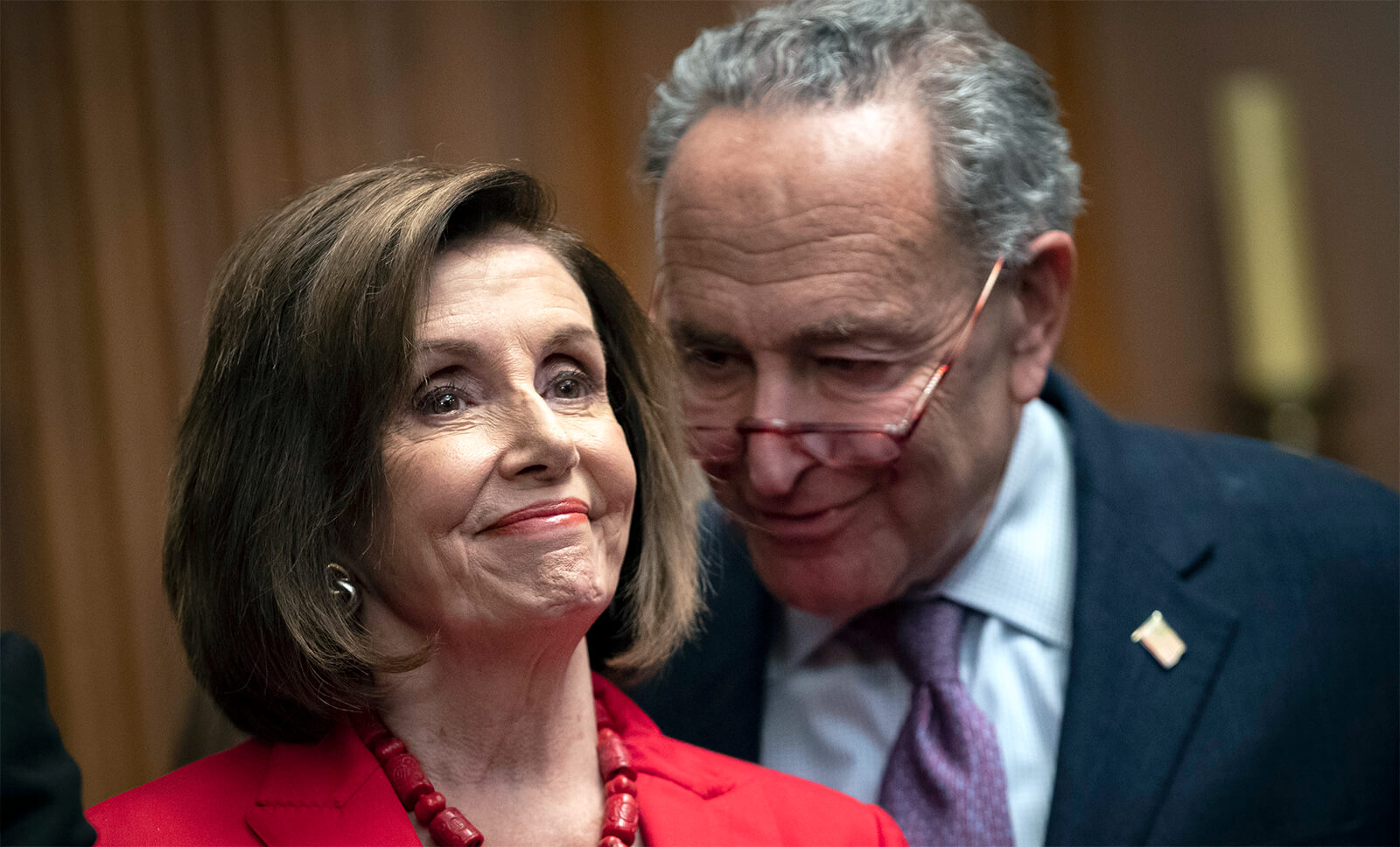AFSCME members on the front lines of the battle against the coronavirus enlisted high-powered help on Tuesday – House Speaker Nancy Pelosi and Senate Minority Leader Chuck Schumer – to bolster their effort to persuade Congress to send aid to struggling state and local governments.
Pelosi and Schumer joined Shirley Thomas, a Florida school custodian; Blake Andersen, a California emergency medical technician; Jason Suggs, a Maryland unemployment claims processor; Jared Rosenberg, a New York paramedic supervisor; and AFSCME President Lee Saunders to underscore how important it is for Congress to plug massive holes that have opened up in state and local budgets due to plummeting revenue.
AFSCME members are seeking $700 billion from Congress, including $300 billion in unrestricted aid to help state and local governments rebuild public services, and $200 billion each in education and health care funding.
However, many members of Congress, led by Senate Majority Leader Mitch McConnell (R-Ky.), have opposed giving any aid to state and local governments. McConnell went so far as to say last week that states should simply declare bankruptcy. States that go that route would have to fire legions of workers at a time a record 26 million workers have filed for unemployment in just one month, and gut essential services.
Pelosi said the House is writing the next aid bill, “which must contain robust funding for state and local governments to pay front-line workers.”
“Our heroic public workers are risking their lives to keep us safe. How can we look them in the eyes, and say, as Mitch McConnell will, ‘Too bad?’ Congressional Democrats will not accept this senseless, callous attitude,” said Pelosi (D-Calif.) “Public service workers help to save the lives of others. Your lives are at risk, and now your jobs are, too.”
Schumer accused McConnell of playing politics with the livelihood of public service workers who have stepped up to protect the country.
“This isn’t about politics. It’s about people. People’s jobs. People’s families. People’s communities,” said Schumer (D-N.Y.). “Congress should not abandon any workers, especially public service workers. … America needs to do all we can to fight against the coronavirus and rising unemployment. The McConnell plan will only drive up unemployment even higher. The coronavirus doesn’t care if it’s a ‘blue’ state or a ‘red’ state.”
Saunders explained what congressional assistance would mean for communities and citizens who rely on public services every day.
“State and local aid is not an abstraction. It means the schools are strong. It means the trash gets picked up. It means the streets and roads get fixed. It means clean water comes out of the tap. It means, when you call 911, the ambulance shows up in time,” Saunders said. “We cannot beat this pandemic and re-open our economy if these front-line workers are thanked with pink slips.”
Getting congressional aid means Thomas, who was recently furloughed, could return to work and afford a medical procedure she was forced to put off. And it would allow Andersen, Suggs and Rosenberg to continue providing essential public services at this pivotal moment.
"We can’t reopen schools without the work custodians like myself to do keep them clean and safe for our young ones,” said Thomas, a member of Council 79 (AFSCME Florida) and a 19-year custodian for Duval County Public Schools. “When this pandemic hit, I didn’t abandon the kids or the school where they come for a safe place to learn. I hope Congress won’t abandon me or others like me who just want to help get our communities back on their feet.”
Andersen was part of a team that helped care for coronavirus-infected passengers of the Grand Princess cruise ship, which was docked for a week in March in the Bay area. Now he’s working at a nursing home in Woodland, California, where six patients have died from COVID-19.
“We can’t make our communities safe now, and we certainly can’t reopen our communities, if first responders and other public service workers on the front lines are laid off,” said Andersen, a member of United EMS Workers/AFSCME Local 4911. “But we are already seeing workers furloughed or losing hours at a time when we really cannot afford to let up and take our eye off the ball.”
Suggs said years of cuts to public services are taking their toll as state and local governments struggle to provide essential services in the thick of the pandemic. Without congressional help, states and localities would be forced to decimate basic services, warned Suggs, president of AFSCME Local 3641 (Council 3).
“You never know when something like [the coronavirus pandemic] is going to happen, and we can’t be short-staffed when we have to process millions of claims. We can’t be short-staffed when communities are counting on us,” Suggs said. “We can’t be short-staffed at a moment of crisis.”
Rosenberg has had to battle the coronavirus without basic weaponry – fighting through an acute shortage of N-95 respirators, gloves, masks and other protective gear. The paramedics he supervises are stretched razor thin. Having staff cutbacks would be devastating to the 84,000 residents of Greenburgh, New York.
“It would be dangerous and a national disgrace to lay off the public service workers who have stepped up for our communities every day,” said Rosenberg, president of the Greenburgh EMS unit for CSEA, AFSCME Local 1000. “We need Congress to immediately send our communities the aid we need and deserve. We can’t beat this virus and recover as a nation if we cut the services and the public service workers we need now more than ever.”
